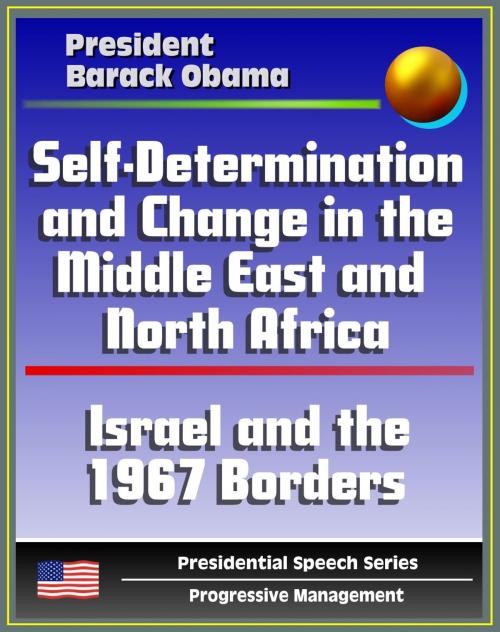Self-Determination and Change in the Middle East and North Africa: Policy Speech by President Barack Obama, May 2011 - Islam, Israel and the 1967 Borders, Palestine, Libya, Egypt, Tunisia, Iraq, Iran
Nonfiction, Social & Cultural Studies, Political Science| Author: | Progressive Management | ISBN: | 9781458078223 |
| Publisher: | Progressive Management | Publication: | May 20, 2011 |
| Imprint: | Smashwords Edition | Language: | English |
| Author: | Progressive Management |
| ISBN: | 9781458078223 |
| Publisher: | Progressive Management |
| Publication: | May 20, 2011 |
| Imprint: | Smashwords Edition |
| Language: | English |
Here is the complete text of the historic speech given by President Barack Obama on May 19, 2011 about self-determination and change in the Middle East and North Africa, plus extensive material from the State Department about Administration policy towards Bahrain, Egypt, Jordan, Libya, Morocco, Syria, Tunisia,
Yeman, Iraq, Iran, Israel and the Palestinians, and more. As a bonus, it also includes the full text of the speech by Obama given at Cairo University in Cairo, Egypt on June 4, 2009 calling for a new beginning between the United States and Muslims.
President Obama lays out his vision for a new chapter in American diplomacy as calls for reform and democracy spread across the Middle East and North Africa. Obama declared: That story of self-determination began six months ago in Tunisia. On December 17th, a young vendor named Mohammed Bouazizi was devastated when a police officer confiscated his cart. This was not unique. It’s the same kind of humiliation that takes place every day in many parts of the world -– the relentless tyranny of governments that deny their citizens dignity. Only this time, something different happened. After local officials refused to hear his complaints, this young man, who had never been particularly active in politics, went to the headquarters of the provincial government, doused himself in fuel, and lit himself on fire.
There are times in the course of history when the actions of ordinary citizens spark movements for change because they speak to a longing for freedom that has been building up for years. In America, think of the defiance of those patriots in Boston who refused to pay taxes to a King, or the dignity of Rosa Parks as she sat courageously in her seat. So it was in Tunisia, as that vendor’s act of desperation tapped into the frustration felt throughout the country. Hundreds of protesters took to the streets, then thousands. And in the face of batons and sometimes bullets, they refused to go home –- day after day, week after week -- until a dictator of more than two decades finally left power.
The story of this revolution, and the ones that followed, should not have come as a surprise. The nations of the Middle East and North Africa won their independence long ago, but in too many places their people did not. In too many countries, power has been concentrated in the hands of a few. In too many countries, a citizen like that young vendor had nowhere to turn -– no honest judiciary to hear his case; no independent media to give him voice; no credible political party to represent his views; no free and fair election where he could choose his leader.
This is a privately authored news service and educational publication of Progressive Management.
Here is the complete text of the historic speech given by President Barack Obama on May 19, 2011 about self-determination and change in the Middle East and North Africa, plus extensive material from the State Department about Administration policy towards Bahrain, Egypt, Jordan, Libya, Morocco, Syria, Tunisia,
Yeman, Iraq, Iran, Israel and the Palestinians, and more. As a bonus, it also includes the full text of the speech by Obama given at Cairo University in Cairo, Egypt on June 4, 2009 calling for a new beginning between the United States and Muslims.
President Obama lays out his vision for a new chapter in American diplomacy as calls for reform and democracy spread across the Middle East and North Africa. Obama declared: That story of self-determination began six months ago in Tunisia. On December 17th, a young vendor named Mohammed Bouazizi was devastated when a police officer confiscated his cart. This was not unique. It’s the same kind of humiliation that takes place every day in many parts of the world -– the relentless tyranny of governments that deny their citizens dignity. Only this time, something different happened. After local officials refused to hear his complaints, this young man, who had never been particularly active in politics, went to the headquarters of the provincial government, doused himself in fuel, and lit himself on fire.
There are times in the course of history when the actions of ordinary citizens spark movements for change because they speak to a longing for freedom that has been building up for years. In America, think of the defiance of those patriots in Boston who refused to pay taxes to a King, or the dignity of Rosa Parks as she sat courageously in her seat. So it was in Tunisia, as that vendor’s act of desperation tapped into the frustration felt throughout the country. Hundreds of protesters took to the streets, then thousands. And in the face of batons and sometimes bullets, they refused to go home –- day after day, week after week -- until a dictator of more than two decades finally left power.
The story of this revolution, and the ones that followed, should not have come as a surprise. The nations of the Middle East and North Africa won their independence long ago, but in too many places their people did not. In too many countries, power has been concentrated in the hands of a few. In too many countries, a citizen like that young vendor had nowhere to turn -– no honest judiciary to hear his case; no independent media to give him voice; no credible political party to represent his views; no free and fair election where he could choose his leader.
This is a privately authored news service and educational publication of Progressive Management.















